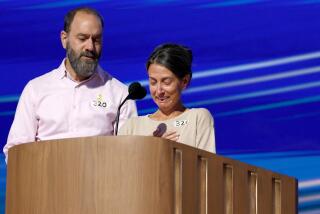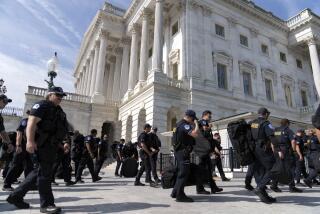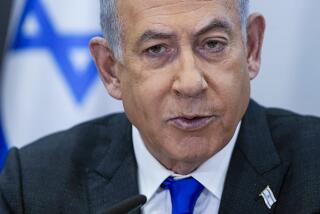Shultz to Talk With 2 U.S. Palestinians : Meeting Could Put Pressure on Israel; Jerusalem Protests
- Share via
WASHINGTON — Secretary of State George P. Shultz, opening a new relationship with Palestinian leaders, Friday invited two members of the PLO’s “parliament in exile” to confer with him at the State Department, a step that may put new pressure on Israel to go along with the new American peace initiative.
The Israeli government immediately protested the meeting, scheduled for today. An Arab-American leader hailed it as “a giant step forward.”
The State Department announced that Shultz would meet Edward W. Said and Ibrahim Abu Lughud, members of the Palestine National Council, the organization that the Palestine Liberation Organization refers to as its “supreme authority.”
Not Members of PLO
However, department spokeswoman Phyllis Oakley said that the two, both Palestinian-born American citizens, are not members of the PLO itself and, therefore, that the meeting will not violate the U.S. government’s 13-year-old pledge not to negotiate with the organization.
Said is a Columbia University professor of English and comparative literature and author of several books, including the recently published “Blaming the Victims,” a study of scholarly and journalistic distortions about the Palestinian people and history. Abu Lughud is chairman of the political science department at Northwestern University in Evanston, Ill., and the author of several published works on the Middle East.
Israeli Ambassador Moshe Arad protested to the State Department and Israeli Prime Minister Yitzhak Shamir handed a similar protest note to U.S. Ambassador Thomas R. Pickering. American Jewish leaders generally deplored the meeting and its timing.
Trying to Broaden Contacts
Shultz has been trying to broaden U.S. contacts with Palestinian leaders, including those who express the views of the PLO, ever since he began last month his latest drive to revive the Middle East peace process. The Shultz formula calls for negotiations between Israel and a mixed delegation of Jordanians and Palestinians. No Palestinian leaders have agreed to participate in talks under those conditions because the PLO maintains that Palestinians should be represented separately.
So far, no party but Egypt has endorsed the Shultz plan. Shamir is opposed, but Israel’s coalition government has not adopted a position.
Shultz’s meeting with Said and Abu Lughud is intended to send signals to both the Palestinians and the Israelis. The message to the Palestinians is that the United States is interested in their problems and would not allow them to become submerged in a delegation dominated by Jordan’s King Hussein. The message to the Israelis is that unless they sign on to the Shultz plan soon, the United States may broaden its contacts with the sort of Palestinians that Israel would like to exclude from the peace process.
Israelis Draw Line
The Israeli government has said that it is prepared to permit any of the 1.5 million Palestinian residents of the West Bank and Gaza Strip to participate in a joint Jordanian-Palestinian delegation. But it has said that it will not negotiate with Palestinians who live outside the occupied territories because it maintains that only Palestinians already living in the West Bank or Gaza Strip have any right to discuss the future status of the territories.
A group of 15 West Bank and Gaza Palestinians, under pressure from the PLO, refused to meet with Shultz last month in Jerusalem. PLO spokesmen said that they would have approved the meeting if Shultz had agreed to meet separately with overseas Palestinians. Shultz refused to do so at that time.
Shultz met in January with Hanna Siniora, an East Jerusalem newspaper editor, and Fayez Abu Rahme, a Gaza lawyer. Both have close relations with the PLO, but Shultz’s meeting with them was more acceptable to Israel because both are residents of the occupied territories.
2 Congressmen Object
California Rep. Mel Levine (D-Santa Monica) and Rep. Benjamin A. Gilman (R-N.Y.) sent a letter to Shultz warning that the meeting today “might be seen as an erosion of the U.S. position regarding the PLO.” The lawmakers said it is “unwise to take any steps that might jeopardize American credibility in the peace process at this especially sensitive point in time.”
Burton S. Levinson of Los Angeles, national chairman of the Anti-Defamation League of B’nai B’rith, said of the meeting: “It really puts a lot of pressure on the Israeli side of the equation. Israel is a sovereign nation, and I don’t think it’s appropriate for an ally of Israel to tell Israel who it should talk to about peace on its borders.”
Rabbi Israel Miller of New York, a former chairman of the Conference of Presidents of Major Jewish Organizations, said: “There’s not much point in negotiating with members of the PNC without (Jordan’s King) Hussein. I don’t really look upon it as a positive manifestation of movement.”
‘Reflects an Awareness’
However, former Sen. James Abourezk, chairman of the American-Arab Anti-Discrimination Committee, was enthusiastic. “It reflects an awareness of reality that has not been present for a long, long time in this or any other Administration,” he said.
Shultz’s planned meeting with the PNC members comes against the background of a Justice Department lawsuit to close the PLO’s observer mission at the United Nations in New York.
In a related development, President Reagan called on Israel to refrain from staging a preemptive attack on surface-to-surface missiles that Saudi Arabia recently obtained from China.
“I hope they are not considering any such act,” Reagan said. White House spokesman Marlin Fitzwater added that the Administration is concerned both about Saudi Arabia’s acquisition of the missiles and about a possible Israeli response.
“We simply urged calm and consideration on both sides,” he said.
More to Read
Sign up for Essential California
The most important California stories and recommendations in your inbox every morning.
You may occasionally receive promotional content from the Los Angeles Times.










